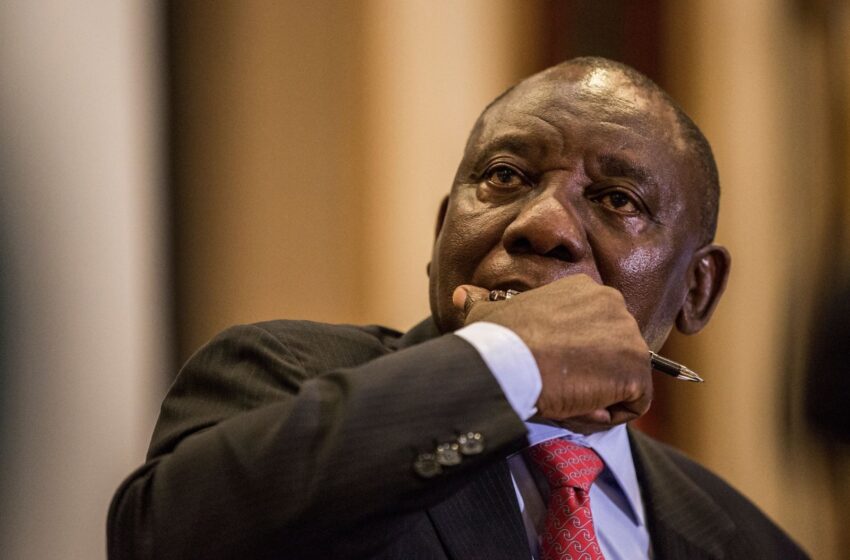What Eswatini’s agreement with US means for South Africa’s security

South Africa President Cyril Ramaphosa
The South African government has expressed concern over the potential security implications of convicted criminals being deported from the United States to neighbouring Eswatini.
Although the specifics of Eswatini’s arrangement with the US remain unclear, authorities in the Southern African kingdom have confirmed that at least five such individuals are currently being held in their prisons, with the likelihood of more arrivals in the coming months.
The development has sparked criticism globally, with some accusing the United States of offloading foreign nationals it deems undesirable onto African countries ill-equipped to manage their reintegration. Critics say the move reflects a troubling trend of powerful nations exploiting less influential ones for political convenience.
Amid worsening US trade relations with Africa under President Donald Trump’s administration, speculation is rife that Eswatini’s acceptance of the prisoners may be part of a broader effort to curry favour with Washington. Trump has intensified efforts to deport non-US citizens serving time in American prisons, but in many cases—particularly for nationals from countries such as Jamaica, Laos, Cuba, Yemen, and Vietnam—their home governments have refused to take them back.
The US Department of Homeland Security has stated that those sent to Eswatini have been convicted of serious crimes, including child rape and murder, raising red flags for neighbouring countries.
South African Department of International Relations and Cooperation (DIRCO) spokesperson, Chrispin Phiri, said Pretoria is monitoring the situation closely due to Eswatini’s proximity.
“Whilst respecting the sovereign decision of the government of Eswatini, the government of the Republic of South Africa is deeply concerned about the profile of these individuals and the potential adverse impact on South Africa’s national security and immigration policy, given the geographical proximity of the two sisterly countries,” he said.
In response, Eswatini’s government spokesperson, Thabile Mdluli, said efforts are underway to work with the International Organisation for Migration (IOM) to eventually facilitate the return of the inmates to their countries of origin.
The situation remains fluid, but it has triggered broader discussions about global deportation policies, Africa’s geopolitical leverage, and the responsibilities of states in handling internationally displaced criminals.
Analysis: What Eswatini’s Agreement with the US Means for South Africa’s Security
The recent revelation that Eswatini has accepted deported criminals from the United States raises significant red flags for South Africa, especially given the geographical, economic, and social ties between the two countries. Although the details of Eswatini’s agreement with the US remain murky, the potential security implications for the broader Southern African region—particularly South Africa—are becoming clearer.
1. Geopolitical Proximity and Border Porosity
Eswatini shares a lengthy and relatively porous border with South Africa. Despite formal checkpoints, the movement of people and goods—both legal and illicit—is common. If individuals convicted of serious crimes such as child rape and murder are being housed in Eswatini without clear legal frameworks or plans for containment, it presents a tangible security risk for South Africa.
The possibility of such high-risk individuals escaping custody or integrating into regional criminal networks cannot be ignored. South Africa, already grappling with violent crime and a strained policing system, may find itself burdened by crimes or criminal elements originating from across the border.
2. Regional Precedent and International Dumping
This move sets a worrying precedent for Southern Africa. If Eswatini is seen as willing to accept deported foreign criminals, other nations may follow suit or find themselves pressured to do the same in exchange for economic or diplomatic gains. It could signal a new era of so-called “criminal dumping” into smaller or politically vulnerable African states.
South Africa, being the region’s economic powerhouse, would likely become a destination or transit point for such individuals, either legally or illegally. This would further strain its immigration control systems and raise tensions with countries viewed as enabling the inflow of undesirable foreign elements.
3. Immigration Policy Challenges
South Africa already faces public scrutiny over its immigration policies and porous borders, often inflamed by xenophobic sentiments. The potential for violent criminals to infiltrate South African society under such circumstances could heighten domestic tensions and contribute to anti-immigrant sentiment.
This development could force the South African government to re-evaluate its immigration and asylum policies, border control mechanisms, and security cooperation with neighbours. There may also be calls for stricter vetting of foreign nationals from countries involved in such deportation arrangements.
4. Strain on Bilateral Relations and Regional Diplomacy
While South Africa has officially expressed its respect for Eswatini’s sovereign decisions, the undertone of concern in its response is evident. Accepting criminals rejected by their own countries under unclear terms reflects poor transparency and undermines collective regional efforts on crime prevention and security.
This incident could place strain on diplomatic relations between South Africa and Eswatini. It may also necessitate an urgent Southern African Development Community (SADC) dialogue on common security threats and shared responsibility, especially regarding foreign actors.
5. Collaboration with International Organisations: A Ray of Hope?
Eswatini’s stated plan to work with the International Organization for Migration (IOM) to eventually repatriate the inmates to their countries of origin could be a constructive step. However, this approach assumes that deportation or reintegration to original countries will be accepted, which has already proven difficult in the current scenario.
South Africa must remain alert to how this plays out, advocating for clear timelines, conditions of incarceration, and transparency in processes involving foreign convicts within neighbouring territories.
Conclusion
Eswatini’s arrangement with the United States to receive deported criminals poses a serious and complex challenge to South Africa’s national security and immigration stability. With limited regional coordination on such sensitive matters, South Africa may find itself exposed to new threats unless proactive diplomatic and security measures are taken.
The situation calls for immediate regional consultation, policy review, and strengthened cross-border surveillance. It also highlights the need for Africa to push back collectively against being treated as a dumping ground for unwanted foreign nationals—especially those with criminal backgrounds—by more powerful nations.

